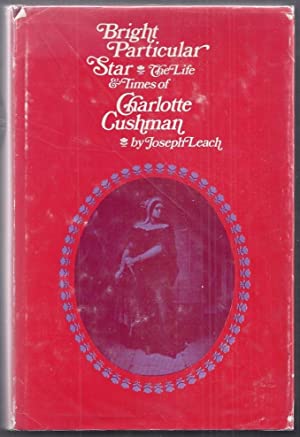Bright Particular Star
The Life & Times of Charlotte Cushman
Joseph Leach

But reading on, I felt that perhaps the tone was appropriate. Charlotte Cushman’s life bears a close relationship to the conventions of romantic fiction; sometimes, indeed, surpasses them. She had a difficult beginning. Starting with a false success as an opera singer, cast in roles that lay too high for her natural contralto, she soon failed miserably. Improbably, this girl who was to become successful in playing male dramatic roles began her stage career singing the Countess in The Marriage of Figaro to a Susanna who, as Clara Fisher, had played Richard III at Drury Lane when she was six years old. Charlotte Cushman experienced difficulties, both personal and professional, appropriate to a heroine of a theatrical novel; and before long she began also to experience the triumphs.
She turned to the drama, and had an early success as Lady Macbeth. By the time she was twenty-seven she was playing this role with Macready. She was no beauty, but she had great stage presence, a remarkable voice which she could use to masterly effect, a strong intelligence, and a resolute determination to succeed. She could play comic roles, such as Lady Teazle, Rosalind, and Beatrice, but was more famous for her Lady Macbeth, her Queen Katherine in Henry VIII, her Meg Merrilies in an adaptation of Guy Mannering, and other characters in melodramas now never performed. She was a virtuoso actress of the old school. Reading accounts of the effect she had on her audiences, one almost wonders whether we have any actors left nowadays.
Her art was creative rather than interpretative. A newspaper critic quoted by Mr. Leach seems to have reached the heart of the matter when he wrote that it was her ‘sobs and sighs, and groans, rather than the text of the playwright, which elicited the applause of the audience by touching their sympathies’. Because she could act between the lines, she could transcend her material. She made a speciality of masculine roles, playing Romeo, Hamlet, and even Cardinal Wolsey. In private, too, she revealed masculine characteristics that embarrassed her family and tangled her emotional life. She devoted herself with apparent intensity and integrity to a succession of more or less talented women, and was rewarded by love and companionship.
She became acknowledged as the greatest American actress, and repeated her triumphs in London. She won great wealth, and retired several times; but she needed work, Mr. Leach convincingly suggests, as an opiate for personal sorrows. She was the friend of many of the most eminent men and women of her time, English and American, and this helps to make the story of her life a real contribution to the cultural history of the nineteenth century. She contracted cancer, but went on working. Great public honour was done her in her dying years. Mr. Leach tells this part of his story with full appreciation of its possibilities.
By the time he had told me how the lad who had rescued Charlotte Cushman from drowning when she was a child turned up and identified himself in her last years, and how she gave a reading in aid of his church as a sign of her gratitude, and how the callboy into whose hand she had once pressed a twenty-dollar gold piece when she found him unwell also turned up, and how he presented her with a cheque for a thousand dollars as ‘interest’, I was with Mr. Leach all the way. Not for nothing is the presence of Charles Dickens, rebuked early on for his hostility to America, but forgiven later when he recanted, felt in this book. The editor gave it to me for review just before I went on holiday. It was a good choice. ~ Stanley Wells, The Modern Language Review, Vol. 66, No. 3 (Jul., 1971)
Check for it on:
Details
| ISBN | 9780300012057 |
| Genre | Autobiography/Biography; Grier Rated |
| Publication Date | 20-Aug-70 |
| Publisher | Yale University Press |
| Format | Hardcover |
| No. of Pages | 453 |
| LoC Classification | PN2287.C8 .L4 |
| Language | English |
| Rating | Great |
| BookID | 1523 |
